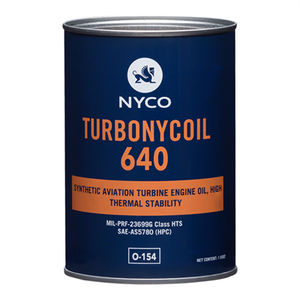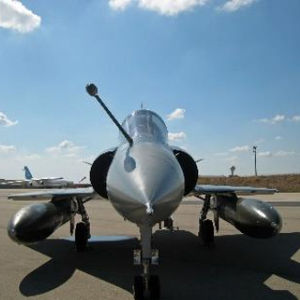
Lubricating oil TURBONYCOIL 600syntheticturbinefor industry
Add to favorites
Compare this product
Characteristics
- Function
- lubricating
- Composition
- synthetic
- Product applications
- turbine
- Field
- for industry
- Other characteristics
- anti-corrosion, high-temperature
Description
The reference in STD/SPC turbine oils
DESCRIPTION
TURBONYCOIL 600 is a standard lubricating oil with a viscosity of 5 cSt at 100°C based on high thermal stable polyol esters, and fortified with carefully selected anti-oxidant, antiwear and anti-corrosion additives.
APPLICATIONS
Turbine oil for military and civil aircraft and helicopters
Accessories (APUs, starters, IDGs, THS, propellers, …)
Stationary industrial applications (aero-derivative gas turbines)
MAIN BENEFITS
Engine cleanliness (excellent non-coking performance)
Low volatility at high temperature
High flash point
Low foaming tendency
Superior lubricity
APPROVALS
SAE AS5780 Class SPC*
MIL-PRF-23699 G Class STD
DCSEA 299/A
DEF STAN 91-101 Iss.3, Amd. 1
NATO CODE O-156
OX-27 / OX-28
Airbus CML ref. 03ABA1
*A more stringent specification compared to MIL-PRF-23699, as it encompasses all the requirements of the military specification as well as specific OEMs testing requirements. TURBONYCOIL 600 is approved by all major engine manufacturers (General Electric, Pratt and Whitney Canada, Allison, Rolls-Royce, Snecma, Klimov, Turbomeca and CFMI among others). It is used by major oil companies, packagers and service companies worldwide and has logged over 60 million operating hours since 1985.
Catalogs
No catalogs are available for this product.
See all of NYCO‘s catalogsRelated Searches
- Synthetic lubricant
- Synthetic oil
- Mineral lubricant
- Anti-corrosion lubricant
- Bearing lubricant
- High-performance lubricant
- Industry oil
- High-temperature lubricant
- Mineral-based oil
- Gear lubricant
- Bearing grease
- High-performance oil
- Anti-corrosion oil
- Universal lubricant
- High-temperature oil
- Chain lubricant
- Low-temperature lubricant
- Synthetic grease
- Lithium grease
- High-temperature grease
*Prices are pre-tax. They exclude delivery charges and customs duties and do not include additional charges for installation or activation options. Prices are indicative only and may vary by country, with changes to the cost of raw materials and exchange rates.








